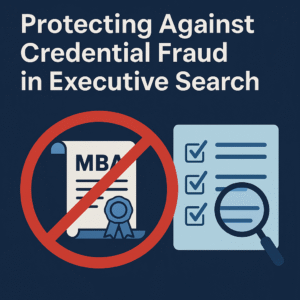
Imagine the fallout if a newly hired CEO or CFO were exposed for holding a fake degree. This is not just a hypothetical. It has occurred at major companies and remains a growing risk in today’s global talent market. Credential fraud, from embellished resumes to outright forged diplomas, is on the rise worldwide and increasingly affecting top executives. For executive search firms tasked with vetting leaders, the stakes have never been higher.
The Rising Threat of Credential Fraud
Credential fraud is no longer confined to low-level applicants. The fake diploma industry has evolved into a multibillion-dollar enterprise, with online “diploma mills” selling thousands of counterfeit degrees annually. These fraudulent credentials are sophisticated enough to evade casual checks, complete with fake transcripts, sham accreditation bodies, and websites that mimic the appearance of real universities.
High-profile cases prove the danger is real. Executives at global corporations have been forced to resign after journalists or whistleblowers uncovered false educational claims. Similar scandals have shaken political leaders in Europe and start-up founders in Asia, where fabricated degrees slipped through initial vetting. With global hiring on the rise, the risk of fraudulent credentials entering senior leadership pipelines has never been greater.
Why Executive-Level Fraud Is So Dangerous
At the executive level, the consequences of fraud multiply. An unqualified leader in the C-suite can do more than underperform; they can also cause significant harm. They can jeopardize strategy, damage culture, and erode trust with investors, employees, and customers. When deception is exposed, companies face reputational harm, public backlash, and even shareholder lawsuits.
Executive-level fraud is also harder to detect. Senior candidates often have long, impressive careers that create a false sense of security. Many search committees assume credentials were verified earlier in the person’s journey. Meanwhile, diploma mills have become increasingly adept at creating convincing documents and even answering verification calls with scripted confirmations. This enables seasoned fraudsters to evade traditional checks for years.
The Limits of Background Checks
Most search processes include background checks, but these are not designed to catch credential fraud. Traditional screenings focus on criminal records, employment history, or credit reports. Education is often treated as a box to tick, confirmed with copies provided by the candidate or a cursory call to a registrar.
This approach has serious flaws. Some employers do not verify degrees at all, relying instead on trust or references. Fake institutions are ready to “verify” their own counterfeit diplomas if contacted. And when credentials come from overseas, language barriers and unfamiliar education systems make it easy for fraudulent degrees to slip through. The result is that too many fraudulent credentials pass undetected.
How Credential Evaluation Protects Against Fraud
Credential evaluation provides the depth and rigor that background checks cannot. It goes beyond surface-level confirmation by:
- Verifying authenticity: Requiring official academic records sent directly from institutions, not from candidates.
- Confirming legitimacy: Ensuring that the issuing institution was accredited and recognized at the time the credential was awarded.
- Assessing equivalency: Translating international degrees into the hiring country’s framework so employers understand exactly what a qualification represents.
- Meeting compliance standards: Checking that credentials meet regulatory and licensing requirements in sectors such as finance, healthcare, engineering, and law.
By integrating credential evaluation, search firms reduce hiring risk, safeguard their reputation, and deliver added value to clients. It is not just about catching fraud. It is about giving clients confidence that every leader presented has been fully vetted.
Practical Steps for Executive Search Firms
To protect against credential fraud, executive search firms should:
- Verify all degrees and professional certifications for finalist candidates.
- Partner with credential evaluation experts who specialize in international education systems.
- Require official transcripts and documents sent directly from issuing institutions.
- Check the accreditation status of every institution.
- Use online verification systems and databases where available.
- Train consultants to identify red flags, such as suspicious institutions or inconsistent career timelines.
- Communicate verification as a standard part of the firm’s value proposition to clients and candidates.
Safeguarding Trust in Leadership
Credential fraud is a growing challenge, but it is not insurmountable. By adopting credential evaluation as a standard practice, executive search firms can protect their clients from embarrassment, financial loss, and reputational harm. More importantly, they reinforce the principle that leadership must be built on trust, authenticity, and integrity.
In a world where fake credentials are easier to obtain than ever, thorough evaluation is not optional. For executive search, it is the difference between placing a leader who truly earned their role and one who only appeared to have done so. Protecting against credential fraud is not just about avoiding scandals. It is about ensuring that organizations are led by people worthy of the trust placed in them.
Partner with ACEI
For over three decades, the Academic Credentials Evaluation Institute (ACEI) has been helping organizations, universities, and employers accurately and integrity verify international credentials. Our evaluations go beyond basic checks to confirm authenticity, institutional legitimacy, and global equivalencies.
If you are an executive search firm seeking to enhance your vetting process and deliver greater value to clients, ACEI can help you mitigate risk, foster trust, and expedite placements.
Contact us today to learn how our credential evaluation services can enhance your job search process and safeguard your reputation.
